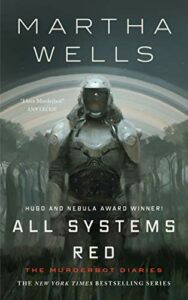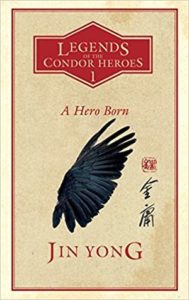 Q: Every book has its own story about how it came to be conceived and written as it did. How did The Rig evolve?
Q: Every book has its own story about how it came to be conceived and written as it did. How did The Rig evolve?
A: It came very slowly. I was processing a lot of things in my life while completing Icarus, and The Rig came in fits and starts. I wanted to say something about how isolated we can be, how poorly we comprehend the world and the people around us, and how much we need all those people and their understanding. And of course I wanted to do it with mystery and suspense and action – so not ambitious at all! A few scenes and characters – the Chute, Alef and Pellonhorc, Razer – came first, and of course the concept of AfterLife, and everything else just flowed from there. It flowed like cold treacle. It’s really hard to say more without giving spoilers, as I’m sure you’ll understand.
Q: The Rig deals with the intersection of faith and technology in a way I find refreshingly different from most other science fiction. Religion and tech were also important themes in one of your previous books, Dark Heavens. What inspires your ongoing engagement with these subjects?
A: It’s always intrigued me that so many of us can hold in the mind, and quite comfortably, two such conflicting systems as evidential science and belief in a god. There is an evolutionary advantage to having a belief. As you say, I’ve previously looked at the malign manipulation of those holding faith in a technologically advanced society, and in The Rig I’m looking at a different aspect. Might we begin to shed faith only to find that we suffer in the absence of its comfort, and need some way to replace those comforts? Thus AfterLife.
Q: When Razer, the writer in The Rig, is asked why she writes, she responds “curiosity and dissatisfaction.” I couldn’t help but wonder if she was speaking for you as well. What are your reasons for being a novelist, and particularly one who writes science fiction?
A: Yes, Razer is speaking for me. As for my reasons for being a novelist, I just wanted, always, to write. It was never a reason for me, but a drive. The best motivation to write that I ever heard, though, was Hubert Selby Jr’s reasoning, ‘I know the alphabet. Maybe I could be a writer.’ And where science fiction is concerned, when Reckless Sleep was picked up, the die was cast and I was a science fiction writer. In fact I wouldn’t have it any other way. Science fiction is an inexhaustible repository of ideas. Those who write it and those who read it are the most varied, inquisitive, disputatious, interesting of people.
Q: Do you write with any particular audience in mind? Are there any particular audiences you hope will connect with this story?
A: I always write for myself, in the hope that if something interests me, it might interest others. I like to be caught in a story, to be challenged, to learn something, and I like it when a story has a twist or two that I don’t see coming. I hope I’ve done some of those things in The Rig. I’d like my writing to be conversing with readers, not speaking at them.
Q: What is the first book you read that made you think, “I have got to write something like this someday!”
A: That would be Wasp, by Eric Frank Russell. I was twelve or thirteen, and the first pages just hooked me.
Q: I very much enjoyed the way you incorporated linguistic evolution into the writing of The Rig. Words like “goddery” and “threedy” reflected the social incorporation of futuristic developments in religion and technology in a way that felt very natural. I also enjoyed your playful almost-puns, e.g. ParaSites, arkestras. What stimulates your experimentation with language?
A: Thank you. I’ve always loved puns and wordplay. Shortly after I’d thought of putery, I went to Bletchley Park, where the Enigma codes were broken, and discovered that Alan Turing had talked of computery. That satisfied me a lot. I derive as much writing pleasure from wordplay as from plot and idea. And I enjoy reading a book so much more if the writing, word by word and sentence by sentence, is as interesting as the greater span.
Q: Do you adhere to any particular writing regimen, given your other, very busy (ed: I originally used the word worthy but it somehow got changed in the interview process) occupation as an NHS dentist?
A: I am part of a writing group, which keeps my work ticking along, and I try to go once a year to a writing retreat in Spain, run by my friend Anne Aylor, who also teaches there. Other than that, I write when I can, but it’s always in my head, composing and recomposing itself.
Q: We usually like to ask whether an author is a pantser (someone who writes by the seat of their pants) or a plotter, but it’s hard to imagine a novel as layered and thoughtful as The Rig being written extemporaneously. Did you find yourself surprised, however, by any unexpected directions the plot took outside of what you’d planned?
A: I’m a pantser who panics and becomes a plotter. There was a lot of panic in the writing of The Rig, a great many holes I dug myself into. There was also an entire subplot that got cut. But yes, the plot skidded all over the place, and I was constantly steering it back. I knew where I wanted it to end, and how, but the book didn’t want to make it easy. And without the detailed editing of Miranda Jewess and Ella Chappell at Titan, it certainly wouldn’t be what it is.
Q: I can’t help but be fascinated by Razer’s evolution through the course of The Rig. Arguably, she becomes the most important, if unsung, shaper of AfterLife through her actions and omissions. What is your opinion on the power of the written word to influence history and civilization?
A: That’s such an interesting question. I think that the spoken word is more important in the moment, than the written – look at Churchill, Hitler, Martin Luther King – but the written word comes into its own as event becomes history. We have always acted from the spoken word and learnt from the written word. Having said that, I realise I’m talking about the considered written word, the cold and detailed analysis, and we’re in a time when the written word is not always so considered. The written word now has to be instant and short. And what worries me is that this new written word may influence history and civilisation to the point of annihilation, and it may come in a tweet.
Q: One thing I desperately wanted to read more of in The Rig was the subject of The Question. This actually led me to wonder whether The Question was left deliberately vague so that the reader could assign their own interpretations to the accompanying faith. Can you tell us more about The Question, or will that be the subject of another novel?
A: Yes, it was left deliberately vague, and not solely for the reason you suggest, though of course you’re right. There are clues to its basis in the book, both actual and by omission, but I don’t want to say much more. Without being cryptic, mystic or coy, The Question isn’t even, necessarily, a faith as we understand it. What it may be, from a human perspective, is hopeful. And where some beliefs claim answers, I wanted the idea of uncertainty. I wanted to provoke thought. My character representing The Question is named in reference to a character in Italo Calvino’s Cosmicomix, and Calvino is a writer of metafiction. I’d say more, but there’s the risk of spoilers.
Q: What can you tell us about your next project?
A: Just that it’s set a little closer to home and a little nearer to now.
Q: What are you reading at the moment?
A: I always have a number of books on the go. At the moment I’m going through Adam Hall’s Quiller series.
Q: Are there any new books or authors in science fiction that have you excited?

A: I wouldn’t single anyone out, nor give gravity to my own personal taste.
Q: Tell us why you love your book!
A: Apart from the simple fact that it’s finished? I’m really happy with the twists. I have a great fondness for the humechs, Beata and Lode, who crept up on me. But what I really love about it is the beautiful cover by Julia Lloyd at Titan.
~~~
Author links:
RogerLevy.co.uk
~~~
The Rig was published May 8th 2018 and is available via all good book sellers. My review of the book itself may be found here.






